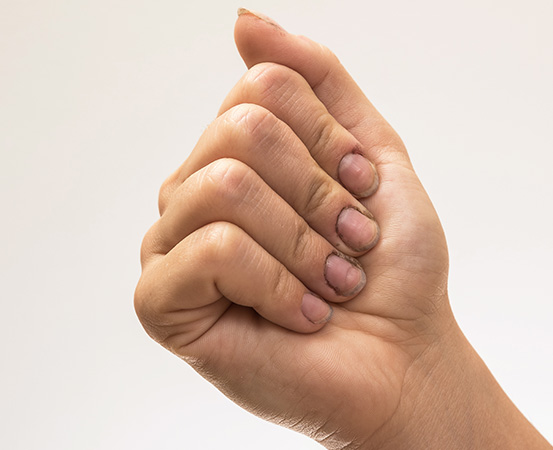
Nails are composed of dead cells that protect fingertips but many times, even these small parts of the body can give clues about one’s health status. People with diabetes can often note changes in their nails, indicating high sugar levels and potential infections.
Nails are primarily composed of a tough protein called keratin. Dr Sameer Apte, consultant, dermatologist, SRV Hospitals, Dombivli, Mumbai, says strong, clear nails indicate good nutrition and general health. On the other hand, brittle or discoloured nails might be due to symptomatic underlying issues, ranging from nutritional deficiencies to systemic diseases like diabetes.
What do nail changes indicate?
“Nails provide support, allowing for delicate tasks like picking up small objects or scratching. They also aid in the sensation of touch, acting as a counterforce to fingertips,” says Dr Apte.
Diabetes can affect nails, especially in two ways, says Dr Tejaswi V, consultant, endocrinologist & diabetologist, Kauvery Hospitals, Electronic City, Bangalore. “Nail changes can be due to hyperglycemia or high sugar levels and inflammation, which is promoted by advanced glycation end products (harmful compounds formed when glucose in the body reacts with protein and other components). High sugar also affects the proliferation of keratinocytes (skin cells). These result in nail changes,” he says, adding that even people with controlled diabetes can develop nail changes due to the long duration of the disease but the risk is less, compared to those with high sugar.
What do diabetes nails look like?
There can be several changes in the nails, but they need not be exclusive to diabetes. They can be seen in other conditions as well, says Dr Apte. Some of the nail changes observed in people with diabetes include:
- Yellowish or brownish discoloration
- Thickening of the nails
- Brittle nails
- Slow nail growth
- Neuropathy can add increased risk of developing ingrown toenails.
- Spoon-like or curved nails
Can diabetes change nail color?
Most common changes in nails that are observed include thickening of nails and infections. Dr Shireen Furtado, senior consultant – medical & cosmetic dermatology, Aster CMI Hospital, Bangalore, says thickening of nails is one of the signs of diabetes. “It thickens to such an extent that it can peel off. Unfortunately, the person takes a long time to heal when it peels off due to diabetes. The other condition that we commonly see among diabetics is fungal infection called onychomycosis. Sometimes, the nails get so thick that it gets difficult to cut,” she adds.
One can also develop infection around the nail. Dr Apte says, “Paronychia often results from minor trauma or bacterial or fungal invasion. In diabetics, it can be more severe and difficult to treat due to compromised immune function.” Dr Furtado adds when people get manicures, it can damage the cuticles, increasing the possibility of some bacteria entering the nails and causing paronychia.
Fungal infections can also be a predictor for diabetic foot ulcer, says Dr Tejaswi. Nail changes can also be caused by vascular damage and neuropathy due to diabetes. He says, “Vascular problems can lead to reduced circulation, causing discoloration of the nails. The nerve damage can cause lack of sensation or feel, resulting in minor trauma and subungual hematoma where blood gets collected under the nail.”
Complications of nail abnormalities
If left untreated, these infections can cause further complications such as secondary bacterial infections or cellulitis. Dr Apte says, “An untreated nail infection or injury can spread, causing a bacterial skin infection known as cellulitis, which can be severe and require hospitalisation.”
As the pain sensation is usually less in people with diabetes, they may not even know that there are some problems with their nails. “By the time they probably realise, it would have been too late, and the infection would have spread. It can sometimes cause loss of finger,” says Dr Furtado. “We give oral antifungals to treat fungal infections and it is given in pulses so that there is no cumulative effect of the drug, and it helps reduce the fungal infection of the new nail that is growing out,” she says. She adds in case the skin and nail become extremely thick to the extent where they can’t be cut and there is a tendency for infection to grow, the safest thing to do then is remove the nail, if the diabetes is under control.
How to prevent nail changes in diabetes
Experts advise people with diabetes to avoid doing manicures and pedicures frequently or do them under supervision to help prevent any nail issues.
Some measures to help prevent nail changes in diabetes include:
- Good control of diabetes
- Use of appropriate footwear
- Good nail care
- Keep monitoring for any changes in nails like color, thickness or texture
- Trim nails properly to avoid ingrown toenails
- Use moisturiser on nails and the surrounding skin to prevent cracking, which can serve as a conduit for infections.
- Seek medical attention in case of any issues with the nails
Takeaways
- Nails can help predict diabetes and its complications.
- People with diabetes can have thick and discolored nails.
- They are more prone to develop fungal and bacterial infections in and around the nails.
- They may not feel any pain due to diabetic neuropathy, which can lead to further complications.
- It is important to keep the sugar under control and regularly monitor for any nail changes.


















One Response
Well written